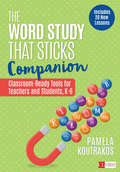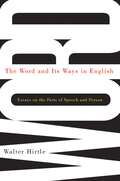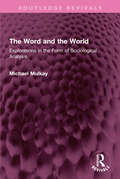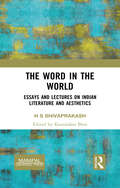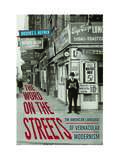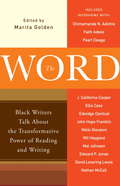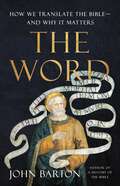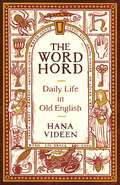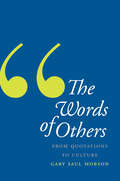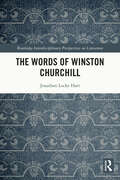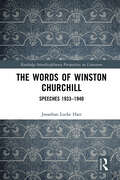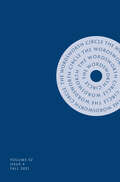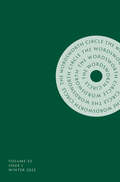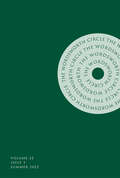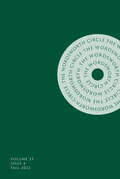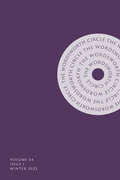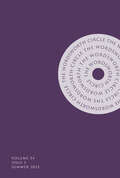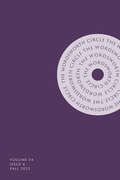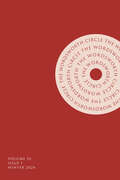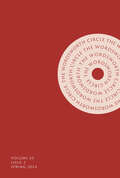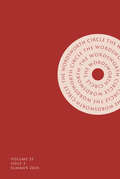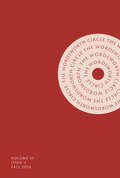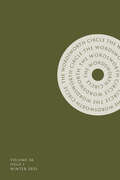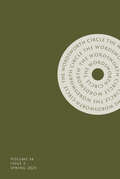- Table View
- List View
The Word Study That Sticks Companion: Classroom-Ready Tools for Teachers and Students, Grades K-6 (Corwin Literacy)
by Pamela A. KoutrakosFirst Pamela Koutrakos delivered a systematic approach to inquiry-based, student-centered, and joyful word study in her book Word Study That Sticks. Now, in The Word Study That Sticks Companion, Koutrakos offers tools and resources to help teachers put those structures, lessons, and routines into action. Loaded with teacher-facing resources such as planning and assessment tools, and student-facing tools such as reproducible minicharts, choice checklists, and self-assessments, The Word Study That Sticks Companion includes Ready-to-go materials that greatly minimize the time teachers spend preparing, creating, and revamping word study lessons More than 100 student-friendly, reproducible minicharts for student notebooks that summarize the routines in each area of word study and support robust word learning Twenty brand-new word study lessons to extend the learning throughout the year and across content areas Ideas for word study notebooks and choice charts that give students ownership of daily practice Suggestions for replicating many routines and tools in a digital format Customizable cycle schedules, checklists, look-fors, planning guides, record-keeping forms, and other tools that help teachers crystalize priorities, organize instruction, and adapt for all learners The routines and resources here can be used within any curriculum, as they transcend any one program, philosophy, or approach to word study. The Word Study That Sticks Companion enables consistent, authentic, and independent word study practice in K–6 classrooms. With these materials in hand, students can take charge of their learning, and teachers gain more time for differentiated instruction. Discover what’s possible when you ditch word study worksheets and workbooks once and for all!
The Word and Its Ways in English: Essays on the Parts of Speech and Person
by Walter HirtleAn exploration of how the mind creates words and, in turn, how words represent intended meanings.
The Word and the World: Explorations in the Form of Sociological Analysis (Routledge Revivals)
by Michael MulkayFirst published in 1985, The Word and the World is a significant, empirically-based contribution to the sociological analysis of scientists’ discourse and scientific culture. It also offers a radical departure from established forms of sociological discourse which has far-reaching implications for all areas of sociological study. The central aim of this book is to widen the range of textual forms used in empirical sociological research, and thereby to increase sociologists’ ability to furnish interesting, valid and practically useful conclusions. The unusual textual forms employed for the purposes of sociological analysis are ‘the play’, ‘the investigative inquiry’, ‘the participant-analyst dialogue’, and ‘the parody’. One of the main substantive topics that provides the material for these explorations in form is the ‘scientific debate’. This book will be of interest to students of sociology, rhetoric, linguistics and science.
The Word in the World: Essays and Lectures on Indian Literature and Aesthetics
by H S ShivaprakashThe Word in the World is a collection of essays and lectures by H S Shivaprakash, a well-known poet, playwright, and translator. Edited by Kamalakar Bhat, this book brings together Prof Shivaprakash’s interventions in the realm of issues that are entwined with the continuities and discontinuities in the cultural negotiations of India. Distinctively, these are essays on subjects ranging from the nature and significance of medieval works of literature in India to issues arising out of developments in Indian aesthetics. The unfeigned magnitude of this work must be found among students and scholars, who will gain from it a perspective significantly different from the ones available in the prevailing academic discourses, thus indicating a way beyond poststructuralist/postmodernist frameworks. This is a book that will interest a wide variety of readers with its engaging insights and breadth of reference especially because it is written in a comprehensible style. Print edition not for sale in South Asia (India, Sri Lanka, Nepal, Bangladesh, Pakistan and Bhutan)
The Word on the Streets: The American Language of Vernacular Modernism
by Brooks E. HefnerFrom the hard-boiled detective stories of Dashiell Hammett to the novels of Claude McKay, The Word on the Streets examines a group of writers whose experimentation with the vernacular argues for a rethinking of American modernism—one that cuts across traditional boundaries of class, race, and ethnicity.The dawn of the modernist era witnessed a transformation of popular writing that demonstrated an experimental practice rooted in the language of the streets. Emerging alongside more recognized strands of literary modernism, the vernacular modernism these writers exhibited lays bare the aesthetic experiments inherent in American working-class and ethnic language, forging an alternative pathway for American modernist practice.Brooks Hefner shows how writers across a variety of popular genres—from Gertrude Stein and William Faulkner to humorist Anita Loos and ethnic memoirist Anzia Yezierska—employed street slang to mount their own critique of genteel realism and its classist emphasis on dialect hierarchies, the result of which was a form of American experimental writing that resonated powerfully across the American cultural landscape of the 1910s and 1920s.
The Word: Black Writers Talk About the Transformative Power of Reading and Writing
by Marita GoldenCritically acclaimed Black writers reveal how books have shaped their personal lives--in often unexpected ways. In these thirteen strikingly candid interviews, bestselling authors, winners of the Pulitzer Prize, and writers picked by Oprah's Book Club discuss how the acts of reading and writing have deeply affected their lives by expanding the conceptual borders of their communities and broadening their sense of self. Edwidge Danticat movingly recounts the first time she encountered a Black character in a book and how this changed her worldview forever; Edward P. Jones speaks openly about being raised by an illiterate mother; J. California Cooper discusses the spiritual sources of her literary inspiration; Nathan McCall explains how reading saved his life while in prison; Pearl Cleage muses eloquently about how other people's stories help one make one's own way in the world; and world-renowned historian John Hope Franklin--in one of the last interviews he gave before his death--touchingly recalls his childhood in the segregated South and how reading opened his mind to life's greater possibilities. The stories that emerge from these in-depth interviews not only provide an important record of the creative life of leading Black writers but also explore the vast cultural and spiritual benefits of reading and writing, and they support the growing initiative to encourage people to read as both a passion and a pastime.
The Word: How We Translate the Bible—and Why It Matters
by John BartonFrom a distinguished Oxford scholar and the author of A History of the Bible, an examination of how biblical translation works and why it matters Throughout history, most Jewish and Christian believers have understood scripture not in the languages in which it was first written but rather in their own—in translation. In The Word, acclaimed Bible scholar John Barton explores how saints and scholars have negotiated the profound challenges of translating the Bible while remaining faithful to the original. In addition to considering questions of literal versus free translation, literary style, inclusive language, and more, Barton draws out scriptural translation&’s role at critical junctures in religious history. Far from a mere academic exercise, biblical translation has shaped how we answer faith&’s most enduring questions about the nature of God, the existence of the soul, and the possibility of salvation.
The Wordhord: Daily Life in Old English
by Hana VideenAn entertaining and illuminating collection of weird, wonderful, and downright baffling words from the origins of English—and what they reveal about the lives of the earliest English speakersOld English is the language you think you know until you actually hear or see it. Unlike Shakespearean English or even Chaucer’s Middle English, Old English—the language of Beowulf—defies comprehension by untrained modern readers. Used throughout much of Britain more than a thousand years ago, it is rich with words that haven’t changed (like word), others that are unrecognizable (such as neorxnawang, or paradise), and some that are mystifying even in translation (gafol-fisc, or tax-fish). In this delightful book, Hana Videen gathers a glorious trove of these gems and uses them to illuminate the lives of the earliest English speakers. We discover a world where choking on a bit of bread might prove your guilt, where fiend-ship was as likely as friendship, and where you might grow up to be a laughter-smith.The Wordhord takes readers on a journey through Old English words and customs related to practical daily activities (eating, drinking, learning, working); relationships and entertainment; health and the body, mind, and soul; the natural world (animals, plants, and weather); locations and travel (the source of some of the most evocative words in Old English); mortality, religion, and fate; and the imagination and storytelling. Each chapter ends with its own “wordhord”—a list of its Old English terms, with definitions and pronunciations.Entertaining and enlightening, The Wordhord reveals the magical roots of the language you’re reading right now: you’ll never look at—or speak—English in the same way again.
The Words of Others
by Gary Saul MorsonIn this lively gambol through the history of quotations and quotation books, Gary Saul Morson traces our enduring fascination with the words of others. Ranging from the remote past to the present, he explores the formation, development, and significance of quotations, while exploring the "verbal museums" in which they have been collected and displayed--commonplace books, treasuries, and anthologies. In his trademark clear, witty, and provocative style, Morson invites readers to share his delight in the shortest literary genre. The author defines what makes a quote quotable, as well as the (unexpected) differences between quotation and misquotation. He describes how quotations form, transform, and may eventually become idioms. How much of language itself is the residue of former quotations? Weaving in hundreds of intriguing quotations, common and unusual, Morson explores how the words of others constitute essential elements in the formation of a culture and of the self within that culture. In so doing, he provides a demonstration of that very process, captured in the pages of this extraordinary new book.
The Words of Winston Churchill (Routledge Interdisciplinary Perspectives on Literature)
by Jonathan Locke HartThe Words of Winston Churchill, a study that ranges over the course of a rich, controversial and remarkable career, is about the power and art of his language as a writer and speaker. Churchill used words as the greatest of poets and orators do, and did so in Parliament and for the people, Britain and the empire, in war and peace, facing the changes in the world, and resisting Hitler and the Nazis. Drawing on the traditions of poetics, rhetoric and textual commentary, the study concentrates on Churchill’s writing and is sensitive to texts and contexts and to the archive. A central matter is Churchill speaking in Parliament and the reception of his speeches there for over six decades, although his work as a writer and a speaker outside the House of Commons is also important. Churchill speaks to the House, the people, Britain, the Empire, the Commonwealth and the world and, in crisis, defends freedom and democracy.
The Words of Winston Churchill: Speeches 1933-1940 (Routledge Interdisciplinary Perspectives on Literature)
by Jonathan Locke HartThis book focuses on a close analysis of selected speeches of Winston Churchill in the House of Commons and some of the responses from fellow MPs from 1933-1940 in peace and war, during the rise of Hitler, and concentrates on foreign affairs. The study will appeal to those interested in Churchill, freedom, tyranny, diplomacy, war and conflict, democracy, politics, the 1930s, the Second World War, Britain, the English-speaking world, Canada, the United States, the British Empire and Commonwealth, Europe, France, Asia, Germany, totalitarianism, Parliament and legislative assemblies, rhetoric, language, style, speech-writing, oral and written communication, literature, history and other areas. The debate between autocracy and the tyrannical totalitarian on the one hand and democracy on the other is the debate of those times and ours. The reader will find many parallels, some chilling, with our own times. Churchill and his contemporaries have much to teach us.Churchill was key to our world history and is a key to understanding what is at stake in the world now.
The Wordsworth Circle, volume 52 number 4 (Autumn 2021)
by The Wordsworth CircleThis is volume 52 issue 4 of The Wordsworth Circle. The Wordsworth Circle (TWC) is an international quarterly learned journal founded in 1970 to facilitate communications among colleagues interested in the lives, works, and times of British, American, and European writers from 1770 to 1850, before and after. TWC publishes original essays, conference papers, letters, editions, bibliographies, textual and historical scholarship, biography, interpretive criticism, and critical theory, as well as interdisciplinary, cultural, and comparative studies. It is concerned with anything that influenced, impinges upon, expresses, or contributes to an understanding of the writers, works, and events associated with Romantic studies and its after-lives.
The Wordsworth Circle, volume 53 number 1 (Winter 2022)
by The Wordsworth CircleThis is volume 53 issue 1 of The Wordsworth Circle. The Wordsworth Circle (TWC) is an international quarterly learned journal founded in 1970 to facilitate communications among colleagues interested in the lives, works, and times of British, American, and European writers from 1770 to 1850, before and after. TWC publishes original essays, conference papers, letters, editions, bibliographies, textual and historical scholarship, biography, interpretive criticism, and critical theory, as well as interdisciplinary, cultural, and comparative studies. It is concerned with anything that influenced, impinges upon, expresses, or contributes to an understanding of the writers, works, and events associated with Romantic studies and its after-lives.
The Wordsworth Circle, volume 53 number 2 (Spring 2022)
by The Wordsworth CircleThis is volume 53 issue 2 of The Wordsworth Circle. The Wordsworth Circle (TWC) is an international quarterly learned journal founded in 1970 to facilitate communications among colleagues interested in the lives, works, and times of British, American, and European writers from 1770 to 1850, before and after. TWC publishes original essays, conference papers, letters, editions, bibliographies, textual and historical scholarship, biography, interpretive criticism, and critical theory, as well as interdisciplinary, cultural, and comparative studies. It is concerned with anything that influenced, impinges upon, expresses, or contributes to an understanding of the writers, works, and events associated with Romantic studies and its after-lives.
The Wordsworth Circle, volume 53 number 3 (Summer 2022)
by The Wordsworth CircleThis is volume 53 issue 3 of The Wordsworth Circle. The Wordsworth Circle (TWC) is an international quarterly learned journal founded in 1970 to facilitate communications among colleagues interested in the lives, works, and times of British, American, and European writers from 1770 to 1850, before and after. TWC publishes original essays, conference papers, letters, editions, bibliographies, textual and historical scholarship, biography, interpretive criticism, and critical theory, as well as interdisciplinary, cultural, and comparative studies. It is concerned with anything that influenced, impinges upon, expresses, or contributes to an understanding of the writers, works, and events associated with Romantic studies and its after-lives.
The Wordsworth Circle, volume 53 number 4 (Autumn 2022)
by The Wordsworth CircleThis is volume 53 issue 4 of The Wordsworth Circle. The Wordsworth Circle (TWC) is an international quarterly learned journal founded in 1970 to facilitate communications among colleagues interested in the lives, works, and times of British, American, and European writers from 1770 to 1850, before and after. TWC publishes original essays, conference papers, letters, editions, bibliographies, textual and historical scholarship, biography, interpretive criticism, and critical theory, as well as interdisciplinary, cultural, and comparative studies. It is concerned with anything that influenced, impinges upon, expresses, or contributes to an understanding of the writers, works, and events associated with Romantic studies and its after-lives.
The Wordsworth Circle, volume 54 number 1 (Winter 2023)
by The Wordsworth CircleThis is volume 54 issue 1 of The Wordsworth Circle. The Wordsworth Circle (TWC) is an international quarterly learned journal founded in 1970 to facilitate communications among colleagues interested in the lives, works, and times of British, American, and European writers from 1770 to 1850, before and after. TWC publishes original essays, conference papers, letters, editions, bibliographies, textual and historical scholarship, biography, interpretive criticism, and critical theory, as well as interdisciplinary, cultural, and comparative studies. It is concerned with anything that influenced, impinges upon, expresses, or contributes to an understanding of the writers, works, and events associated with Romantic studies and its after-lives.
The Wordsworth Circle, volume 54 number 3 (Summer 2023)
by The Wordsworth CircleThis is volume 54 issue 3 of The Wordsworth Circle. The Wordsworth Circle (TWC) is an international quarterly learned journal founded in 1970 to facilitate communications among colleagues interested in the lives, works, and times of British, American, and European writers from 1770 to 1850, before and after. TWC publishes original essays, conference papers, letters, editions, bibliographies, textual and historical scholarship, biography, interpretive criticism, and critical theory, as well as interdisciplinary, cultural, and comparative studies. It is concerned with anything that influenced, impinges upon, expresses, or contributes to an understanding of the writers, works, and events associated with Romantic studies and its after-lives.
The Wordsworth Circle, volume 54 number 4 (Autumn 2023)
by The Wordsworth CircleThis is volume 54 issue 4 of The Wordsworth Circle. The Wordsworth Circle (TWC) is an international quarterly learned journal founded in 1970 to facilitate communications among colleagues interested in the lives, works, and times of British, American, and European writers from 1770 to 1850, before and after. TWC publishes original essays, conference papers, letters, editions, bibliographies, textual and historical scholarship, biography, interpretive criticism, and critical theory, as well as interdisciplinary, cultural, and comparative studies. It is concerned with anything that influenced, impinges upon, expresses, or contributes to an understanding of the writers, works, and events associated with Romantic studies and its after-lives.
The Wordsworth Circle, volume 55 number 1 (Winter 2024)
by The Wordsworth CircleThis is volume 55 issue 1 of The Wordsworth Circle. The Wordsworth Circle (TWC) is an international quarterly learned journal founded in 1970 to facilitate communications among colleagues interested in the lives, works, and times of British, American, and European writers from 1770 to 1850, before and after. TWC publishes original essays, conference papers, letters, editions, bibliographies, textual and historical scholarship, biography, interpretive criticism, and critical theory, as well as interdisciplinary, cultural, and comparative studies. It is concerned with anything that influenced, impinges upon, expresses, or contributes to an understanding of the writers, works, and events associated with Romantic studies and its after-lives.
The Wordsworth Circle, volume 55 number 2 (Spring 2024)
by The Wordsworth CircleThis is volume 55 issue 2 of The Wordsworth Circle. The Wordsworth Circle (TWC) is an international quarterly learned journal founded in 1970 to facilitate communications among colleagues interested in the lives, works, and times of British, American, and European writers from 1770 to 1850, before and after. TWC publishes original essays, conference papers, letters, editions, bibliographies, textual and historical scholarship, biography, interpretive criticism, and critical theory, as well as interdisciplinary, cultural, and comparative studies. It is concerned with anything that influenced, impinges upon, expresses, or contributes to an understanding of the writers, works, and events associated with Romantic studies and its after-lives.
The Wordsworth Circle, volume 55 number 3 (Summer 2024)
by The Wordsworth CircleThis is volume 55 issue 3 of The Wordsworth Circle. The Wordsworth Circle (TWC) is an international quarterly learned journal founded in 1970 to facilitate communications among colleagues interested in the lives, works, and times of British, American, and European writers from 1770 to 1850, before and after. TWC publishes original essays, conference papers, letters, editions, bibliographies, textual and historical scholarship, biography, interpretive criticism, and critical theory, as well as interdisciplinary, cultural, and comparative studies. It is concerned with anything that influenced, impinges upon, expresses, or contributes to an understanding of the writers, works, and events associated with Romantic studies and its after-lives.
The Wordsworth Circle, volume 55 number 4 (Autumn 2024)
by The Wordsworth CircleThis is volume 55 issue 4 of The Wordsworth Circle. The Wordsworth Circle (TWC) is an international quarterly learned journal founded in 1970 to facilitate communications among colleagues interested in the lives, works, and times of British, American, and European writers from 1770 to 1850, before and after. TWC publishes original essays, conference papers, letters, editions, bibliographies, textual and historical scholarship, biography, interpretive criticism, and critical theory, as well as interdisciplinary, cultural, and comparative studies. It is concerned with anything that influenced, impinges upon, expresses, or contributes to an understanding of the writers, works, and events associated with Romantic studies and its after-lives.
The Wordsworth Circle, volume 56 number 1 (Winter 2025)
by The Wordsworth CircleThis is volume 56 issue 1 of The Wordsworth Circle. The Wordsworth Circle (TWC) is an international quarterly learned journal founded in 1970 to facilitate communications among colleagues interested in the lives, works, and times of British, American, and European writers from 1770 to 1850, before and after. TWC publishes original essays, conference papers, letters, editions, bibliographies, textual and historical scholarship, biography, interpretive criticism, and critical theory, as well as interdisciplinary, cultural, and comparative studies. It is concerned with anything that influenced, impinges upon, expresses, or contributes to an understanding of the writers, works, and events associated with Romantic studies and its after-lives.
The Wordsworth Circle, volume 56 number 2 (Spring 2025)
by The Wordsworth CircleThis is volume 56 issue 2 of The Wordsworth Circle. The Wordsworth Circle (TWC) is an international quarterly learned journal founded in 1970 to facilitate communications among colleagues interested in the lives, works, and times of British, American, and European writers from 1770 to 1850, before and after. TWC publishes original essays, conference papers, letters, editions, bibliographies, textual and historical scholarship, biography, interpretive criticism, and critical theory, as well as interdisciplinary, cultural, and comparative studies. It is concerned with anything that influenced, impinges upon, expresses, or contributes to an understanding of the writers, works, and events associated with Romantic studies and its after-lives.
